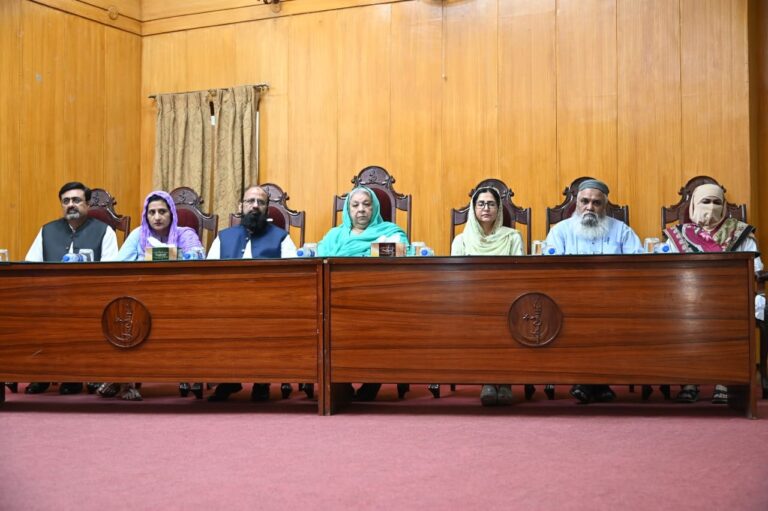
Official Website https://ptgd.punjab.gov.pk
Introduction
The “Punjab Thalassaemia and other Genetic Disorders Prevention and Research Institute” (PTGD) is an initiative of the government of the Punjab to provide screening and prevention services for Beta Thalassaemia and other genetic conditions in the province. The PTGD is attached with Fatima Jinnah Medical University, Lahore and provides comprehensive screening and prevention services of genetic conditions in all the 36 districts of Punjab. The PTGD’s
head office is based in the outdoor building of Sir Ganga Ram Hospital Lahore.
Pakistan is the fifth most populated country in the world and the cultural tradition of consanguineous marriages has resulted in a high prevalence of genetic conditions in the country. Beta Thalassaemia is the most common genetic disorder in Pakistan with a gene prevalence rate of around 6%. This translates that 6 out of every 100 Pakistanis carry this mutant gene. With a population of about 200 million, around 12 million people are healthy carriers of this gene.
Thalassaemia is an autosomal recessive disease, which means that if two carriers get married to each other then they will have a 1 in 4 (25%) chance of having an offspring with B-Thalassaemia Major in every pregnancy. Over 6000 affected children are born annually meaning 17 affected children are born each day in Pakistan. These children require regular monthly blood transfusions and chelation therapy to remove the excess iron from their bodies in order to just
stay alive. An estimated Rs. 600,000 is required for each child per annum. Currently, majority of the patients in Pakistan do not get adequate treatment, especially the transfusion of safe blood has been a big problem and the majority of the Thalassaemics are positive for infections such as Hepatitis B ,C and HIV. Since there is no easily available cure for this disorder, the only hope lies in adopting a preventive program on the line pursued by countries like Italy, Cyprus and Iran, which has resulted in either complete control or significant reduction in the births of new Thalassaemia Major children in these countries.
Considering the gravity of the issue, the Government of Punjab took the lead and initiated Punjab Thalassaemia Prevention Programme (PTPP) in 2009-2010. Dr. Yasmin Rashid was the first Project Director of the program. The PTPP has been a very successful program, therefore, based on its success, the Specialized Health Care & Medical Education Department Punjab decided to enhance the scope of the project to other genetic conditions as well and decided to make it a permanent program. Therefore, in July 2021 the PTPP was converted into an ongoing program titled ““Punjab Thalassaemia and other Genetic Disorders Prevention and Research Institute (PTGD)” as an affiliated unit under Fatima Jinnah Medical University, Lahore.
The PTGD is providing the following comprehensive screening and prevention services for genetic conditions totally
free of cost in all the 36 districts of Punjab:
1. Awareness about Thalassaemia and other genetic conditions
2. Screening of carriers (extended family screening)
3. Pre-marital screening for the general public
4. Genetic Counselling
5. Pre-natal Diagnosis
6. Training of healthcare providers
7. Research
PTGD Network & Infrastructure
The institute’s head office is in Lahore with nine regional centers situated in all the nine divisional headquarters of Punjab including at Sir Ganga Ram Hospital, Lahore (head office), Nishter Hospital Multan, Victoria Hospital Bahawalpur, Holy Family Hospital, Rawalpindi, DHQ Hospital, Gujranwala, Sahiwal Medical College, Sahiwal, DHQ Hospital, Sargodha, Teaching Hospital, DG Khan and Government General Hospital, Ghulam Muhammad Abad, Faisalabad.
Each of the 36 Districts of Punjab are attached to respective regional centers and are proving the above mentioned services. The institute has a community outreach component and in each district there is a mobile field team of PTGD (Field Officers), which provide targeted screening (extended families of affected individuals ) as well as premarital screening services to general population at their doorsteps.
Hematology Laboratory
There are 09 hematology laboratories operational in 09 divisions of Punjab and providing free facility of beta Thalassemia carrier screening
and diagnosis of all hemoglobinopathies. These laboratories are equipped with latest and fully automated CBC Analyzers (Sysmex), Capillary II Zone Gel Electrophoresis, and High Performance Liquid Chromatography (HPLC). The PTGD also has a comprehensive online lab software with machine integration and real time lab reporting to patients and families. The Field Officers collect blood samples from the field and make on line data entry of these samples in the online
software. All the blood samples are received in these labs maintaining cold chain and bar coded. All machines are computer integrated and test results are received by Consultant Hematologists in real time. The consultant Hematologists report the test results and these results are received by Field Officers in real time. All the field Officers are provided with Laptops, printers and internet facility. They take out the prints of test results and deliver to clients observing confidentiality. Genetic Counselling is provided according to the test results. So far the PTGD has screened over 312,259 individuals of 11,289 Thalassemia families. The results show the effectiveness of extended family screening as one third of individuals in Thalassemia families are coming out to be carriers of beta Thalassemia. These Thalassemia carriers could make informed decisions regarding marriages and seeking prenatal diagnosis so that the births of Thalassemia major children could be prevented.
Prenatal Diagnosis
The development of techniques for diagnosing a genetic disorder in-utero is a major advancement in medical genetics, and it has altered the outlook for families at risk of having affected children. Prenatal diagnosis is a procedure to diagnose a genetic disorder such as Thalassemia early in the pregnancy. This has helped in preventing the births of children with Thalassemia Major in countries like Cyprus, Italy, Greece, Turkey and Iran which have prevalence rates as high as 05-17%. Chorionic Villus Sampling is a widely accepted and successful method of prenatal diagnosis. Chorionic villus sampling (CVS) is a test carried out during early pregnancy at 11-15 weeks of gestation to detect specific abnormalities in an unborn baby. A sample of cells is taken from the placenta (fetal in origin) and is tested for genetic defects. CVS is offered in pregnancies where there is a high risk of the baby, having a serious inherited condition like Thalassemia, Down’s syndrome etc. The PTGD provides the CVS test facility at all of its 09 Regional Centers. It is performed by Obstetrician and Gynecologist trained in the procedure of performing CVS and ultrasonography. But the services don’t stop at Diagnosis. The couples who undergo this procedure are counseled before and after the test to make sure they understand why they are taking the test and to receive professional guidance about the choices they have in managing the pregnancy.
DNA Laboratory
The PTGD has established a DNA Lab at Sir Ganga Ram Hospital, Lahore, which is the first public sector DNA lab providing free genetic testing and prenatal diagnosis services for Thalassaemia in the country. The PTGD DNA lab is offering the services of beta Thalassemia Prenatal diagnosis, Beta Thalassemia diagnostic PCR, PCR SNP analysis for Quantitative trait loci (QTL) in beta thalassemia patients and mutation analysis of other hemoglobinopathies. DNA lab also conducted a number of research work activities for better understanding of the disease. The DNA Lab is using a number of modern molecular techniques, like ARMS PCR, Gap PCR, high resolution melt curve analysis by Real Time PCR and direct DNA sequencing for mutation detection. For Prenatal diagnosis, the chorionic villi of fetus and blood samples of carrier couple are required. DNA is extracted from CVS and blood samples using commercially available kits. First round of multiplex ARMS PCR is performed to identify the mutation in the beta thalassemia carrier couple. The inheritance of beta thalassemia mutation in fetus is detected through second round of PCR. The fetus can be heterozygous, homozygous and normal depending upon the pattern of inheritance from carrier parents. The test results are communicated to the patient followed by extensive genetic counseling session to allow the couples with affected fetus to take an informed decision. In case of homozygous beta thalassemia fetus, the family takes a decision regarding termination of pregnancy. The average reporting time for prenatal testing is 2 weeks after receiving the sample in the DNA lab. So far DNA lab has performed 7,534 prenatal diagnosis, 1,933 Beta thalassemia diagnostic PCRs and a large number of QTL PCR of thalassemia patients since last four years. In the year 2021-2022, the DNA Lab received 1,114 CVS samples, which is a very high number compared to the rest of the world. The DNA lab has so far identified many rare and novel mutation in Beta thalassemia patients, which are in the process of publication.
Expansion to Other genetic Disorders
In Sept 2022, the Specialized Health Care & Medical Education Department Punjab has approved a PC1 for the expansion of PTGD services to provide screening and prevention services for other genetic conditions as well. Under this initiative, the PTGD will establish state of the art molecular and cytogenetics labs that could provide screening and prevention services through highly specialized tests such as sanger sequencing, Whole Exome Sequencing, Whole Genome Sequencing, Next Generation Sequencing and latest cytogenetic testing.
Eminent Pioneers
 Prof. Dr. Yasmin Rashid, Health Minister Punjab has been the pioneer of Feto Maternal Medicine in Pakistan as she introduced this service in the country in 1994. Since Beta Thalassaemia is the commonest inherited disorder in Pakistan and prevention of Thalassaemia is considered to be the only viable solution for a developing country like Pakistan, Dr. Yasmin Rashid initiated the Punjab Thalassaemia Prevention Programme (PTPP) as its first Project Director in in 2009- 2010. This prevention program is considered to be one of the largest genetic disorders prevention programs in the world. As the PTPP has been a very successful, intervention, Dr. Yasmin Rashid after becoming the Health Minister of Punjab decided to enhance the scope of the project to other genetic conditions as well therefore, in July 2021 converted the project into an ongoing program titled ““Punjab Thalassaemia and other Genetic Disorders Prevention and Research Institute (PTGD)”.
Prof. Dr. Yasmin Rashid, Health Minister Punjab has been the pioneer of Feto Maternal Medicine in Pakistan as she introduced this service in the country in 1994. Since Beta Thalassaemia is the commonest inherited disorder in Pakistan and prevention of Thalassaemia is considered to be the only viable solution for a developing country like Pakistan, Dr. Yasmin Rashid initiated the Punjab Thalassaemia Prevention Programme (PTPP) as its first Project Director in in 2009- 2010. This prevention program is considered to be one of the largest genetic disorders prevention programs in the world. As the PTPP has been a very successful, intervention, Dr. Yasmin Rashid after becoming the Health Minister of Punjab decided to enhance the scope of the project to other genetic conditions as well therefore, in July 2021 converted the project into an ongoing program titled ““Punjab Thalassaemia and other Genetic Disorders Prevention and Research Institute (PTGD)”.

Dr. Hussain Jafri, Director General, Punjab Thalassaemia and other Genetic Disorders Prevention and Research Institute (PTGD) has been part of the team that initiated the subspecialty of Feto Maternal Medicine in Pakistan in 1994. He started the service of Genetic Counselling in Pakistan and has trained a number of genetic counsellors that are providing Genetic Counselling in different parts of the country. Dr. Hussain Jafri also conceived and authored the PTPP & PTGD and has been instrumental in the success of this prevention program in Punjab. Dr. Hussain Jafri has also worked on an international collaborative research program on Gene Location of inherited disorders, which has resulted in novel gene location of multiple genes of diseases like Microcephaly, mental retardation, blindness, etc.
